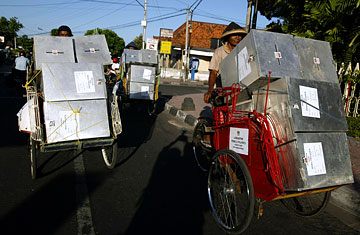
Trishaw drivers transport ballot boxes to polling stations in Yogyakarta, Indonesia, on July 7, 2009
It hardly looked like a vision of democratic perfection. One presidential candidate was the nationalist daughter of a former strongman, while the incumbent was a retired general whose in-law was just jailed for corruption. Two of the vice-presidential nominees had been accused of directing human-rights abuses during their military careers. Yet the election that took place in Indonesia on July 8 was, in fact, testament to the remarkable political experiment unfolding in the world's fourth most populous nation.
Upwards of 100 million voters scattered across 920-plus permanently inhabited islands went to the voting booth. Susilo Bambang Yudhoyono was picked for a second term by roughly 60% of the voting populace, according to unofficial results, outpacing rivals Megawati Sukarnoputri and Jusuf Kalla, who garnered around 27% and 13% respectively. Yudhoyono, popularly known among Indonesians by his initials S.B.Y., was expected to win, not least because his first five-year term wasn't syncopated by the constant drumbeat of political and economic scandals that had marred previous Presidents' tenures. Yet the electoral outcome served as much as a vote of confidence for Indonesia's emerging democracy as a referendum on S.B.Y.
Little more than a decade ago, tens of thousands of Indonesians joined together in a people-power overthrow of dictator Suharto, who had ruled for 32 years. Since then, the country has had four Presidents, with peaceful transitions of power between each leader. Indonesia's success at the ballot box has silenced skeptics who doubted whether Indonesia — with its diversity of islands, religions and ethnicities — could mature into a democratic state. Indeed, compared to countries such as Malaysia and Thailand, where democratic institutions are stagnating if not backsliding, Indonesia has cemented its status as Southeast Asia's political role model.
As the world's largest Muslim-majority nation, Indonesia proves that democracy and Islam need not be incompatible. Even though many leaders of Indonesian Islamic political parties first gained inspiration from the Iranian revolution in 1979, Indonesia today is hardly in danger of hardening into a theocracy willing to gun down unarmed protesters. True, Shari'a-based initiatives have proliferated on a local level, and more Indonesian women wear the veil today than three decades ago. But on a national level, Islamic parties fared poorly in April's legislative polls, winning nine percentage points fewer than they did in 2004. In this month's presidential race, attempts by third-place finisher Kalla to court an Islamic vote backfired.
Of course, many Indonesians feel that change hasn't come fast enough. Around 15% of the country subsists below the poverty line. Corruption still corrodes efforts to increase foreign investment and degrades daily life for everyone from pedicab drivers to entrepreneurs. On its graft-perception index that assigns the cleanest country a rank of 1, global corruption watchdog Transparency International rates Indonesia a dismal 126th out of 180 nations, worse than Nigeria and Nepal. But Yudhoyono made tackling corruption a pillar of his first term. In a country where leaders are expected to protect their own family or clan even at the expense of the state, S.B.Y. didn't stand in the way of the corruption conviction last month of a prominent banker whose daughter is married to the President's own son.
Indonesia has also been surprisingly unscathed by the global financial crisis. Though exports are down, the country recorded 4.4% growth in the first quarter of this year. Local banks are unburdened with the kind of debt crippling financial institutions in other countries. A monthly consumer-confidence survey elicited the second highest level of optimism since August 2006. Buoying hopes is S.B.Y.'s choice for Vice President, principled former Central Bank governor Boediono. Investment bank Morgan Stanley is so impressed that it wondered in a June report whether the country should be added to the so-called BRIC club of economic up-and-comers composed of Brazil, Russia, India and China.
Before the April legislative election in which S.B.Y.'s Democratic Party proved its burgeoning popularity by tripling its showing from the last polls, I walked the streets of Yogyakarta in central Java, marveling at the colorful profusion of campaign posters: the red-and-white star motif of the Democrats, the black bull of Megawati's Indonesian Democratic Party of Struggle, the green banyan tree of Kalla's Golkar Party. Taxis had their radios tuned to political talk shows, and youths on motorcycles revved their engines as they carried their chosen parties' flags through town. I knew that many of these young campaigners were canvassing in exchange for pocket money or gas for their bikes. Still, the democratic energy in Indonesia was undeniable, as omnipresent as the smell of fried shallots and clove cigarettes. On a continent where so many people doubt their vote can make a difference, that alone is achievement enough.
